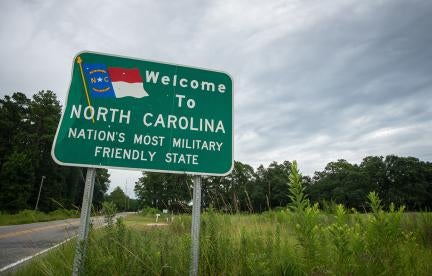CASINO EXPANSION
Some state legislators are considering expanding opportunities for gambling in North Carolina.
The Senate is already considering a bill to legalize mobile sports betting. Given that estimated revenues from mobile sports gambling would pale in comparison to revenue generated by video gaming machines in bars, restaurants, and casinos, the general assembly could be tempted to allow statewide video lottery terminals.
It is anticipated that lawmakers may also consider allowing full casinos to be located on properties other than Native American tribal land, which would be a major shift in North Carolina. Currently, three casinos can be found in North Carolina, two of which are operated by the Eastern Band of Cherokee Indians and are situated in the state's far western region. The third is a Catawba Indian casino that is located on Interstate 85 not far from the South Carolina border.
Although casinos were not mentioned in the budget that the House approved, it is possible that the issue could appear in the budget bill. The state's Medicaid expansion, a top priority for Governor Roy Cooper, depends on the budget's approval. After a Democratic House member switched parties last week, Republicans now hold veto-proof majorities in both chambers. A GOP supermajority, however, does not automatically imply support for casinos. Support for, and opposition to, gambling does not fall neatly along party lines. With ardent supporters and detractors on both sides of the aisle, injecting a controversial issue such as gambling and casino expansion into the appropriations bill could have an impact on what was otherwise shaping up to be a rather quick budget process by North Carolina standards.
MEDICAL TREATMENTS AND PSYCHEDELICS
This year, state legislators are considering legalizing marijuana for medical purposes. A bipartisan group of lawmakers, however, wants to investigate a different class of drug that might be applied to medical procedures.
Recreational drug users have the potential to abuse psilocybin, also referred to as magic mushrooms, and MDMA, also known as ecstasy. New research, however, may indicate that these drugs might be able to treat — and even eliminate — conditions like cluster headaches and post-traumatic stress disorder.
Supporters point to preliminary studies which they say indicate MDMA or psilocybin have shown promise in the treatment of PTSD and other mental illnesses. The FDA classified them as "breakthrough therapies", which could hasten the process of research and development.
The negative connotations associated with psychedelic drugs could prevent the bill from becoming law. However, its backers intend to try to get it approved during this session. A group of Republicans and Democrats in the N.C. House intends to introduce legislation that would allocate $5 million for research on this topic at the state's research universities.
MEDICAL DEBT CONSUMER PROTECTION ACT HEARD IN COMMITTEE
A bipartisan bill submitted in the House and Senate that aims to shield North Carolinians from financial ruin due to medical debt was discussed by state legislators before the Senate Health Care Committee on Wednesday. The bill is supported by State Treasurer Dale Folwell, whose office is in charge of the State Health Plan.
All large medical facilities (hospitals, outpatient clinics connected to hospitals, ambulatory surgical centers, and healthcare practices with annual revenue of at least $20 million) would be required by the Medical Debt Consumer Protection Act to create a Medical Debt Mitigation Policy (MDMP). The MDMP must include the following: (1) a written financial assistance policy, (2) eligibility requirements for financial assistance, (3) information on the financial assistance application, and (4) the facility's billing and collection policy.
Folwell has claimed that unpaid medical debt and low credit scores have been "weaponized" against people, and Senate Bill 321 or its companion, House Bill 367, is dubbed the "Medical Debt De-Weaponization Act." The measure would establish guidelines for financial aid for low-income families, cap medical interest rates at five percent annually, and restrict the collection options available to large medical facilities. Along with other requirements, it would mandate that large medical facilities publish service costs online.
The bill also exempts family members from the medical and nursing home debts incurred by a spouse or parent and holds parents and guardians jointly liable for any medical debts incurred by minors. The attorney general would be responsible for enforcing this law.
NUCLEAR ENERGY = CLEAN ENERGY
Nuclear energy would be included in the state's plans to reduce greenhouse gas emissions, according to a bill in the North Carolina General Assembly.
Senate Bill 678, which passed the Senate Agriculture, Energy, and Environment Committee on Wednesday, would change the definition of "renewable" energy in the statutes to "clean" energy and include nuclear power plants in that category alongside wind and solar power.
The primary sponsor of the bill is Senator Paul Newton (R-Cabarrus), a former executive at Duke Energy, which owns and runs four nuclear power plants in North Carolina.
"Nuclear is going to play, have to play, absent some revolutionary innovation in the field of energy, a major role for us to achieve a carbon-free grid," said Newton. He acknowledged he anticipated opposition from environmentalists concerned about the risks to public safety posed by nuclear waste as well as the rival wind and solar industries.
The Senate Rules Committee is the next stop for the bill.
BANKS VERSUS CREDIT UNIONS
A high-stakes, high-budget battle between traditional banks and credit unions looking to grow is predicted as a result of a push to update North Carolina's 50-year-old state laws governing credit unions.
Debate over what a credit union should be and whether banks offer enough services to rural customers has been simmering for a while, but House Bill 410, introduced by Representative Julia Howard (R-Davie), would also enable credit unions to broaden their “field of membership” and serve more people, not just state employees and their families. The bill would expand the categories of people who are eligible to join, including those who fall below the federal poverty line, women and minority-owned businesses, and residents of the state's poorer regions, regardless of whether they have a customary connection to a credit union.
Banks claim that credit unions are trying to have it both ways by maintaining their tax benefits and nonprofit status while also removing important regulations that set them apart from banks. According to the NC Bankers Association, the bill gives credit unions "extensive new powers" without requiring them to use customer deposits for loans or investments made in North Carolina or guaranteeing that they will open branches there.
The bill was reported favorably after its first hearing by the House Banking Committee on Thursday, and it was referred to the House Rules Committee for further debate.
DISNEY WORLD COMING TO NORTH CAROLINA?
Disney World may want to consider moving to the Tarheel State if they're sick of fighting with Florida Governor Ron DeSantis, according to a proposal from North Carolina Democrats. On Monday, DeSantis threatened the business with a number of things, including that the state would take over ride and monorail inspection and might even sell off land for the construction of a state prison or a competing amusement park.
North Carolina Senate Bill 594, also known as "Mickey's Freedom Restoration Act," was introduced by Senator Michael Garrett (D-Guilford) and two other Democrats. It would establish a commission to investigate "strategic economic incentive plans designed to encourage family parks to expand or relocate" in North Carolina.
The proposed legislation would allocate $750,000 to establish an 11-member commission that would decide whether it was worthwhile to "encourage family amusement parks" to expand into the state with incentives.
The likelihood of the legislation passing the GOP-controlled legislature is still low, as is the likelihood that Disney will move its multibillion-dollar operation, which includes four theme parks, two water parks, and 32 hotels, up I-95.




 />i
/>i

